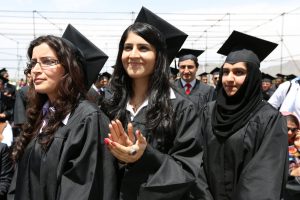While the students of the American University of Afghanistan (AUAF) were enjoying their winter break, and the school’s international faculty celebrated Christmas, a CNN piece suggesting the school’s possible closure sparked anxiety across the AUAF community. Shutting down AUAF would interrupt the studies of its students, leaving their degrees up in the air, and slap the label of a “fair-weather friend” on the U.S. government in the minds of young educated Afghans.
On December 26, CNN reported that the U.S. Agency for International Development (USAID) has not made any firm commitments to restore funding to the school for the coming years. As 60 percent of the university’s budget depends on USAID funding, the college administration board is thinking through possible plans to close next year in May, CNN reported.
David Sedney, former U.S. deputy assistant secretary of defense and current AUAF president, in an official statement titled “AUAF continues operations, looking to grow,” affirmed the university’s dependence on U.S. cash. He reported efforts to “ensure” that funding exists for 2020 and after, suggesting that as long as there is no genuine peace in Afghanistan, there will be a requirement for funding to maintain the security of the institution.
AUAF’s financial troubles are not new. In May, the New York Times reported that the university had been under official scrutiny and even audited by the U.S. government for alleged maladministration. As per the Times, the university has spent $162 million from the United States, of which U.S. investigators were unable to find a record of $63 million. AUAF, in a statement released shortly after the Time’s article, dismissed the allegations as “false” and “misleading,” stressing that AUAF has “fully accounted” for all the USAID money.
In 2016, the university stopped its operations when it lost more than a dozen of its community members, including students and a professor, in a deadly attack orchestrated by the Taliban. Yet AUAF restarted its programs six months later, and students returned with enthusiasm, despite the threats and loss of their classmates.
“My sister almost died when insurgents attacked AUAF, but we came back because this university was worth rejoining. Our families had faith in AUAF, because it enabled Afghans to bring true transformation through standard education” tweeted Balqis Ehsan, a student.
Withdrawing USAID’s funds will put the future of hundreds of AUAF students in question. Since its establishment in 2006, the university has been called the single best higher education institution in the country, one with world-class standards. The university platform revolves around a liberal arts education, with student-centered academic curricula. With scholarships and robust financial aid packages, a number of high school graduates from every corner of the country, with diverse backgrounds, enroll in the university every semester. After graduation, these students take up jobs in leadership positions both inside the government and in the private sector as resilient entrepreneurs. Academically, the university has likewise yielded positive outcomes, as many of the Fulbright scholarship recipients, a highly prestigious and competitive U.S.-funded grant, are AUAF graduates. In 2019 alone, 17 AUAF alumni left for the United States to pursue their masters degrees.
AUAF’s two campuses are some of the few locations in the country that uphold modern democratic principles such as academic liberty, freedom of speech, and women’s rights, creating safe places for debate and serious discussion. Girls constitute half of the student body and mingle freely with boys, without the fear of being harassed or abused. Closing the campus will shatter this democratic oasis for the youth of Afghanistan in Kabul.
Many think the university is being politicized, linking the recent news regarding funding troubles with the Trump administration’s efforts to withdraw U.S. troops from Afghanistan, and shrink the financial expense called for by involvement in Afghanistan. But cutting money without providing alternatives for educational purposes will damage the United States’ reputation gravely. It will demonstrate U.S. irresponsibility and faithlessness, leaving AUAF dangling. Shahrzad Akbar, the chairperson of the Afghanistan Independent Human Rights Commission and AUAF professor of gender studies, tweeted that “the news about possibility of the AUAF shutdown is heartbreaking, not because it will shatter the dreams of so many Afghans, but also because it will signal indifference or despair.”
In arming its students with first-class skills, the university is bringing generational change to Afghan society. Closing AUAF will not only deal a fatal blow to the careers of its students, it will also deepen Afghan mistrust of Americans and the United States. The United States should not leave the American university alone without support, at least not if it wants to leave any good legacy behind.
Ahmadullah Azadani is an elected member of the student government association at the American University of Afghanistan.
































